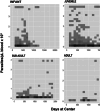Naturally acquired immunity to Plasmodium pitheci in Bornean orangutans (Pongo pygmaeus)
- PMID: 38361461
- PMCID: PMC11044065
- DOI: 10.1017/S0031182024000155
Naturally acquired immunity to Plasmodium pitheci in Bornean orangutans (Pongo pygmaeus)
Abstract
Naturally acquired immunity to the different types of malaria in humans occurs in areas of endemic transmission and results in asymptomatic infection of peripheral blood. The current study examined the possibility of naturally acquired immunity in Bornean orangutans, Pongo pygmaeus, exposed to endemic Plasmodium pitheci malaria. A total of 2140 peripheral blood samples were collected between January 2017 and December 2022 from a cohort of 135 orangutans housed at a natural forested Rescue and Rehabilitation Centre in West Kalimantan, Indonesia. Each individual was observed for an average of 4.3 years during the study period. Blood samples were examined by microscopy and polymerase chain reaction for the presence of plasmodial parasites. Infection rates and parasitaemia levels were measured among age groups and all 20 documented clinical malaria cases were reviewed to estimate the incidence of illness and risk ratios among age groups. A case group of all 17 individuals that had experienced clinical malaria and a control group of 34 individuals having an event of >2000 parasites μL−1 blood but with no outward or clinical sign of illness were studied. Immature orangutans had higher-grade and more frequent parasitaemia events, but mature individuals were more likely to suffer from clinical malaria than juveniles. The case orangutans having patent clinical malaria were 256 times more likely to have had no parasitaemia event in the prior year relative to asymptomatic control orangutans. The findings are consistent with rapidly acquired immunity to P. pitheci illness among orangutans that wanes without re-exposure to the pathogen.
Keywords: One Health-One Welfare; Plasmodium pitheci; malaria; naturally acquired immunity; orangutan; orangutan conservation; veterinary parasitology.
Conflict of interest statement
None.
Figures




References
-
- Austin KF, Bellinger MO and Rana P (2017) Anthropogenic forest loss and malaria prevalence: a comparative examination of the causes and disease consequences of deforestation in developing nations. AIMS Environmental Science 4, 217–231.
-
- Baird JK (1995) Host age as a determinant of naturally acquired immunity to Plasmodium falciparum. Parasitology Today 11, 105–111. - PubMed
-
- Baird JK (1998) Age dependent characteristics of protection v. susceptibility to Plasmodium falciparum. Annals of Tropical Medicine & Parasitology 92, 367. - PubMed
Publication types
MeSH terms
LinkOut - more resources
Full Text Sources
Medical

